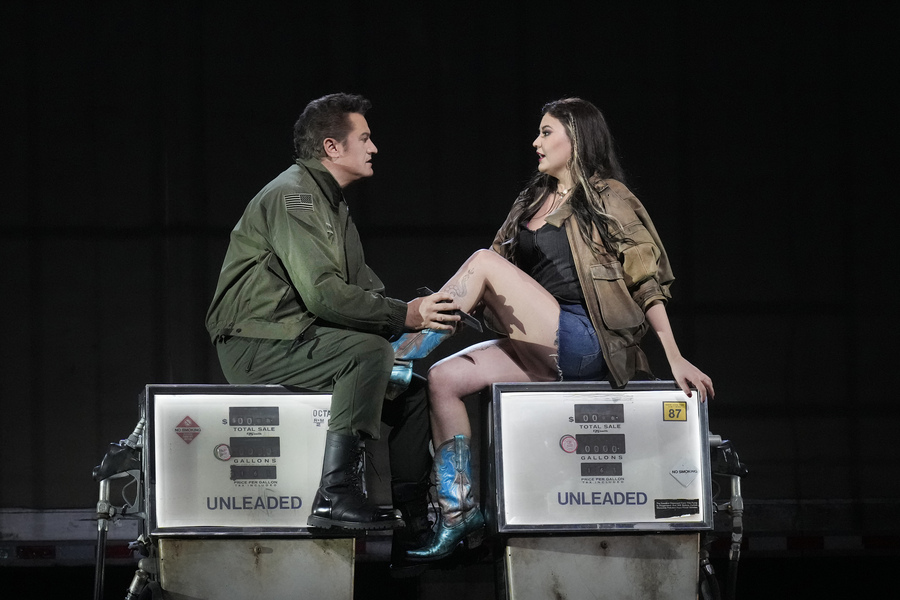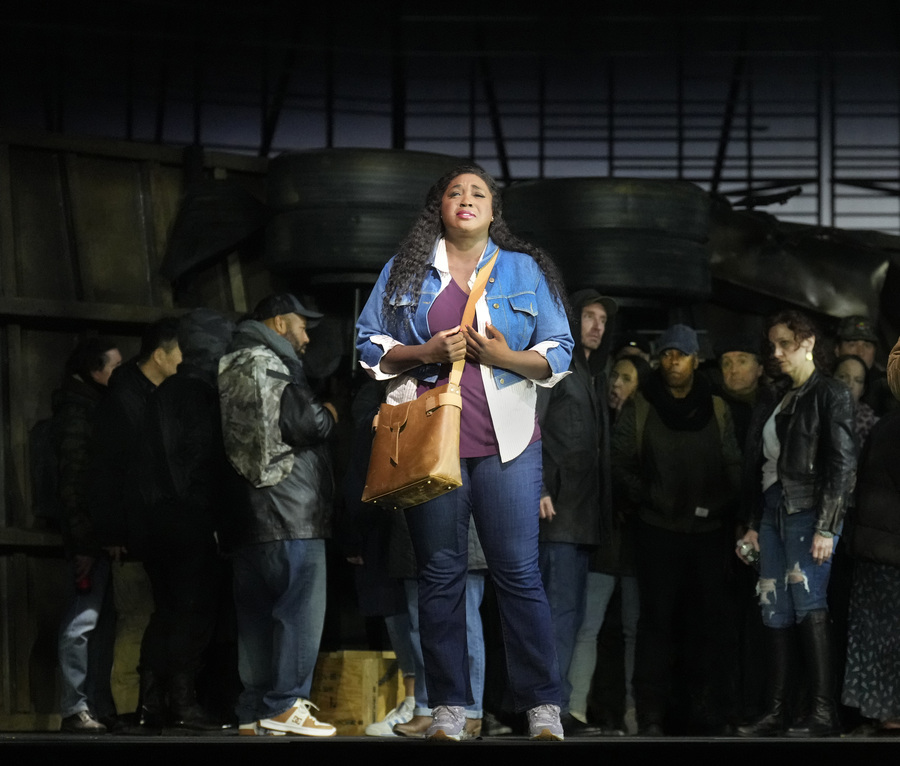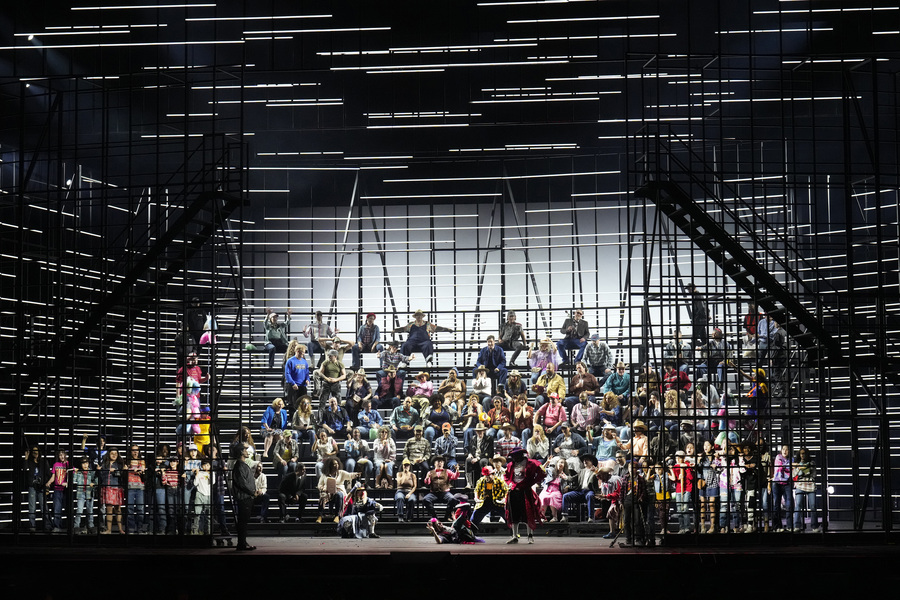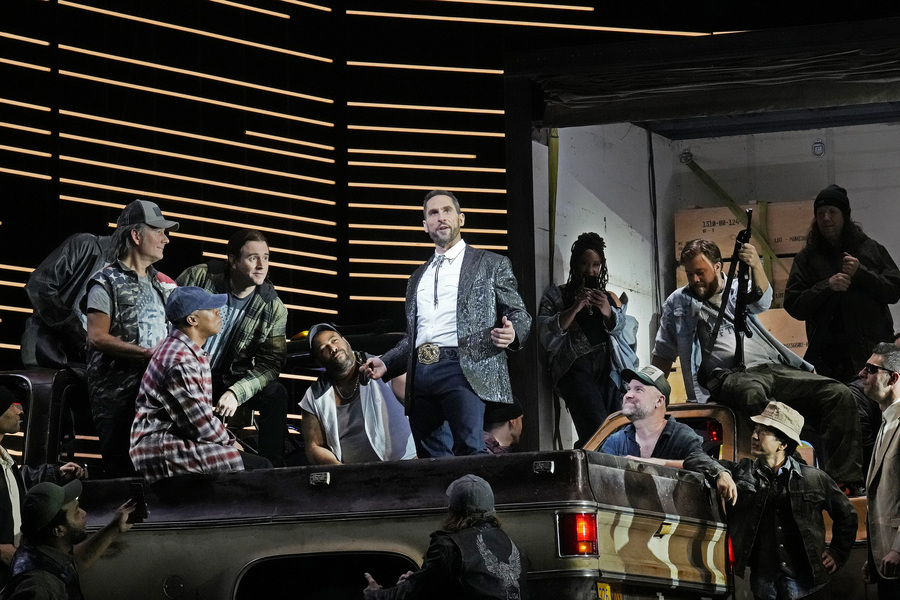Castanets and cigarettes mingle with cars and cowboys in the Metropolitan Opera’s new production of Georges Bizet’s Carmen. Director Carrie Cracknell’s staging puts a novel aesthetic spin on the story, taking us out of nineteenth-century Seville and into the spare, open landscape of the contemporary American southwest. Carmen is an opera about love: its highs and lows, its mercurial dangers, and its magical hold over people’s destinies. But if you imagine the alluring titular Carmen in a fiery dress, you might be surprised to see her on stage wearing jean shorts and cowboy boots, dancing atop a gas pump. While the production excels musically, the staging may not be to everyone’s taste.
The musical aspects of this production, which runs through January 31 and reboots later this spring, are noteworthy. Mezzo-soprano Aigul Akhmetshina stars as the beguiling Carmen, with tenor Piotr Beczała playing Carmen’s obsessive lover Don José. Soprano Angel Blue portrays the wholesome Micaëla, whose heart is promised to Don José, and bass-baritone Kyle Ketelsen plays the rowdy Escamillo whom Carmen ultimately falls for—all supported by a hearty chorus.

Italian conductor Daniele Rustioni’s refined and upbeat direction did justice to Bizet’s music, as did the sensitively engaged musicians of the Met Orchestra who followed the singers with aplomb. A haunting oboe line in Act IV showcased how the orchestra underscores romance’s mysterious and lusty effects. Many people in the audience enjoyed the iconic music, from the boisterous opening prelude to Carmen’s “Habanera,” and the Toreador song. Indeed, no one seemed to relish the music more than the man sitting in front of me, who bobbed his head along to it all with gusto.
Ms. Akhmetshina is a fantastic Carmen, and it is worth attending this production to hear her enchanting singing, bold and colorful in every register—from the moment she dons a trucker hat in her “Habanera” through to the end. Her sultry acting brought out both the intractable and vulnerable sides of Carmen as the character navigates the complexities of her romantic entanglements. The chemistry between Ms. Akhmetshina and Mr. Beczała as Don José, the jealous officer who gives up his ascetic, soldierly life for Carmen, becomes more vivid as the drama develops.
Angel Blue shone especially in Micaëla’s grand aria of Act III. Micaëla summons the courage to confront Carmen, who has entangled Don José in the lifestyle of weapon-smuggling outlaws. The power of Ms. Blue’s voice was transcendent, suffused with passion and intensity that brought the moment to life onstage, swelling to a great crescendo with the lyrics “I pretend to be brave, I’m alone in this deserted place – Lord, give me courage, protect me!”

While the production showcases the talented singers’ vocal skills, the contemporary staging falls flat. Some of the production’s visual elements were distracting and somewhat puzzling, such as the rotating set pieces in Acts III and IV, and the lighting. For example, in Act I, as Carmen and her band of cohorts drive off and dance inside a cavernous tractor-trailer, lights flashed in broken lines behind the truck—perhaps evoking light’s transmission in interstellar travel.
Other aspects of the production worked well. Projected imagery against a white screen began each act, with ghostly figures coming into focus, giving the opera an ominous and fairytale-like quality. The colorful outfits at the rodeo were charming, as if leaning into the staging’s kitschier side. And I’ll never forget Micaëla’s tiny rolling suitcase as she arrives at the factory in Act I looking for Don José.

Carmen’s director Carrie Cracknell has become known through her work shedding new light on period pieces. One of her best-known projects is the 2022 adaptation of Jane Austen’s Persuasion for Netflix. Cracknell aims to put a feminist perspective on Carmen’s story through her staging. In her interview with the Met about the production, she asked important questions about pervasive depictions of female violence: “What do these stories do to our culture? Do they normalize this violence?” These are crucial topics to reckon with, on and off the stage. But it isn’t immediately clear how the staging draws attention to them beyond the story itself.
Carmen was initially pathbreaking for depicting the complicated lives of society’s humble and downtrodden. The story’s unstable and violent acts (both physical and psychological) against women are all too familiar. The unequal power dynamics between men and women are part of the universality of Carmen and remain a potent issue. Ultimately, the music must prevail over the staging. For those wishing to hear the thrilling music of Bizet’s Carmen, a trip to the Met is warranted. The music gives us hope that the power of singing like Carmen’s, despite the opera’s portrayal of life’s difficulties as people seek freedom in every sense, will inspire some “rebellious birds” to take flight.













